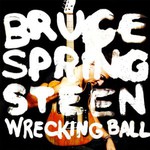Wrecking Ball
Studio Album by Bruce Springsteen released in 2012Wrecking Ball review
Bruce Springsteen is back to his favorite ideas
Wrecking Ball is a true revelation from Bruce Springsteen, a singer, a musician and, most importantly, a poet who turned his art into a mirror of America’s middle class life. Quite recently, the singer seemed to take up a more positive perspective and released Working On A Dream, a CD radiating with his faith in a bright future, Although the record was very professional, his old fans, charitably speaking, did not understand or may be even did not recognize Bruce Springsteen. From out of nowhere came yearning for the guy who used to sing about hardships of ordinary people with a remaracble sincerity and sadness. Only three years later, surprisingly to many, Bruce exploded. On Wrecking Ball he is back to his typical form as he paints discouraging pictures of the US realities. Although we are used to see this American musician caring about his countrymen so much as if each one is a brother to him, we have not heard him so much concerned and strictly judging for a long, long time.
An old story told in a new way
Bruce has already touched upon all these questions and we have heard him telling us stories about ruined lives and broken hearts of people who are not featured in newspapers or movies. Yet on Wrecking Ball, the singer is not set to once again remind us of how far everything is gone. In We Take Care Of Our Own, acting on behalf of the people, he proclaims that they are tired of waiting for the authorities to work on their promises, and that it is time to take care of life on their own. However, Wrecking Ball’s characters are on the edge of despair and they all means are good for them. Easy Money pictures a man who is ready to cross the line as he is not going to slave from dawn till dusk and wants to get easy money. Jack Of All Trades starts off in a more peaceful manner, and the character just intends to find any job available to provide for his family. Yet the final lines have a ruder language, and the man admits to being ready to pull a trigger and get rid of bastards. In the central part of the album one finds two most emphatic tracks. The Depression is a very touching and powerful song with Bruce’s voice full of concern and fear. Wrecking Ball, initially written about the destruction of a popular football stadium, gains a new meaning in the frame of the album. It is now a manifestation of protest and discontent.
The best record from Bruce in the new century
The ending of Wrecking Ball should be seen as the trio of Rocky Ground, Land Of Hope And Dreams, and We Are Alive. All have a deep religious subtext. Bruce urges the people to preserve the power of their spirit. The album finishes in an elevated mood and with an idea that material difficulties will not damage the inner strength of people. The most efficient tool to keep up the idea of unification in times of troubles is the music composed of most various elements. Separate tracks display borrowings from folk, gospel, and hip-hop, but what dominates is the signature form of rock and roll that is typical of most of Bruce Springsteen’s records. At the same time, Wrecking Ball is different from the other dramatic and uneasy album, Nebraska (1982) due to the contrast between the rough lyrics and a fare more positively tuned music surrounding. After all, Bruce keeps his faith in his countrymen and expresses hope that together they will overcome any ordeals. On the whole, the impact and conceptual content make Wrecking Ball the doubtless leader among Bruce’s records released in this century.

